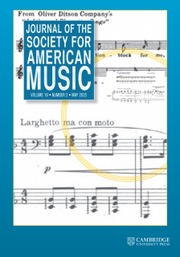No CrossRef data available.
Article contents
“The Hall Does Not Make the Space”: Disrupting Concert Hall Norms in Hannibal's One Land, One River, One People
Published online by Cambridge University Press: 08 September 2021
Abstract
Hannibal's cheering and shouting along with his request for audience participation during the 2015 premiere of his composition One Land, One River, One People caused a stir and created discomfort among the Philadelphia Orchestra audience. I interpret his work as an example of a successful musical direct action within contemporary orchestral music. By exposing and subverting the traditions of the classical concert experience, One Land, One River, One People highlights social boundaries within the genre of classical music itself. I apply Robin James's (2015) concept of Multiracial White Supremacy, or MRWaSP, to contemporary orchestral classical music of the United States. Under late capitalism, MRWaSP helps to explain the potential appeal to an orchestra of commissioning Hannibal, who is known as a “genre-crossing” composer rooted in classical and jazz. Yet I argue that the way in which Hannibal performs his identity along with the piece's inclusion of audience participation allow the music to resist functioning as expected under MRWaSP. Rather than promoting a sense that—as one might expect from the title—we are all “one people,” I see the piece as revealing racial difference and as speaking truth to power.
- Type
- Research Article
- Information
- Copyright
- Copyright © The Author(s), 2021. Published by Cambridge University Press on behalf of the Society for American Music


